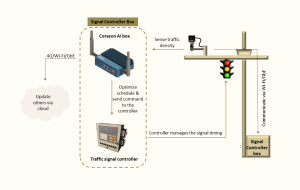The proliferation of artificial intelligence (AI), smart sensors, and connected devices in smart cities has created the demand for intelligent devices and real-time traffic management systems.
Traffic congestion is a growing problem that impacts both vehicle activity and society as a whole. Statistics reveal that in urban cities like that of Bengaluru, which regularly faces long traffic jams and the average speed on some roads at peak hours is just 4km/h (2.5mph).
Even though the present traffic management system is equipped with certain hardware components, they are far from being smart that can deliver advanced management. Furthermore, traditional traffic monitoring cameras provide little value due to their reactive approach to incidents. Since these systems rely on pre-programmed controllers to manage the traffic flow, the ability to dynamically adjust the timing due to irregular events like traffic accidents or construction is not viable. But by using video-equipped with an edge-based AI system, these drawbacks can be eliminated, offering a platform that can transform these legacy systems from a reactive approach to a proactive one.
Fig 1: System Block Diagram
The edge AI-based traffic monitoring system would include an intelligent AI box integrated with an adaptive algorithm, IP cameras, traffic lights, traffic signal controller, and a video management system at the command-and-control center, all carefully integrated into a designed flow. Once all the hardware, detectors, controllers are in place, the system begins its work by capturing the vehicle density at each intersection through an IP camera and sends the data across the AI box. The AI box carefully evaluates the captured data via pre-trained deep learning models to create an optimized plan to move traffic through the intersection as efficiently as possible. The system acts on this plan by sending commands to the controller to coordinate the signal. Finally, the AI box communicates the plan to the neighbouring intersections via the cloud. Hence this solution provides better performance in terms of monitoring and optimizing traffic in real-time.
iWave’s Corazon AI is an Edge AI platform based on the Zynq Ultrascale+ MPSoC device. This device incorporates a deep learning processor unit and an AI inference engine dedicated to Convolutional Neural Network, providing scalable multi-dimensional parallel architecture capable of performing major Convolutional calculations and Batch Normalisation through deep pipelined computing engines. It is integrated with Xilinx Vitis AI Stack that supports advanced pre-trained deep learning models from mainstream frameworks such as Tensor Flow, Caffe, Darknet, Keras, and Pytorch that leverages the development flow of AI applications, hence reducing complexity to design and faster time to market.
Fig 2: Vitis AI Stack
The Xilinx Vitis AI Stack enables developers to accelerate the development flow of AI applications even without in depth-knowledge of FPGA and deep learning. The Stack supports C++/python API’s which provides programming flexibility to the developers. With the provision to assist various interfaces, the Corazon AI box presents a flexible platform to integrate with other traffic equipment. The ability to connect up to 8 IP cameras provides the user with the capability to capture multi-angle high-resolution video frames from various intersections through a single gateway. Besides these, the AI box enables high-speed connectivity such as Dual Gigabit Ethernet and multiple wireless connectivity options such as Wi-Fi, Bluetooth, and Cellular connectivity for the device to communicate to the cloud and servers when necessary. Hence this device serves as an ideal platform for traffic management where computing and data-driven decisions on the edge are essential.
This work shows that the combination of Corazon AI and deep learning can dynamically accelerate the function for real-time AI inference and improve predictability that surpasses the traditional system. As a result, it speeds up traffic time, reduces delay, shortens travel time.
The post Enabling an Intelligent Traffic Management System Using Corazon-AI appeared first on ELE Times.


No comments:
Post a Comment